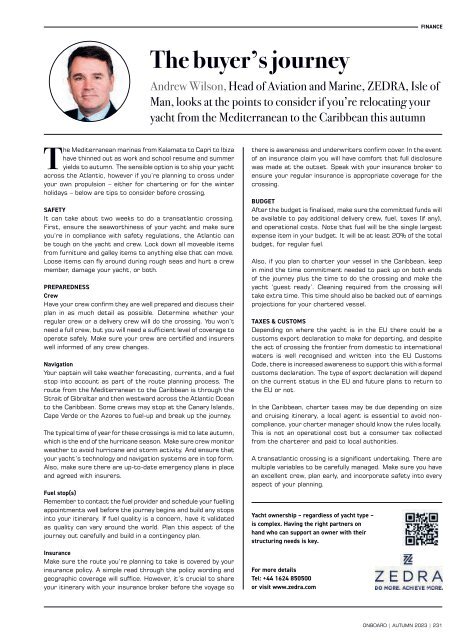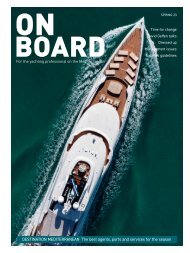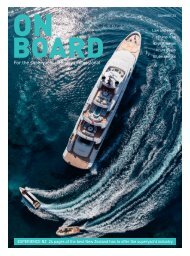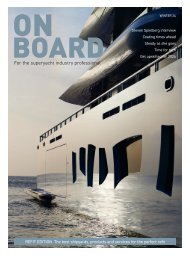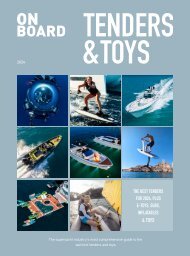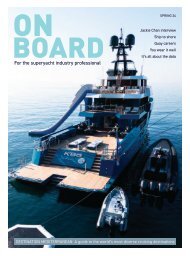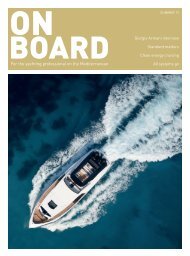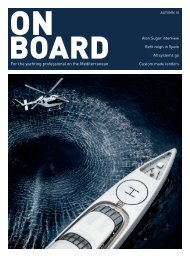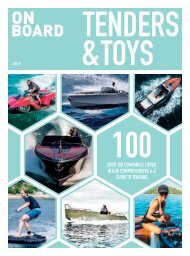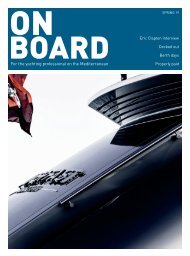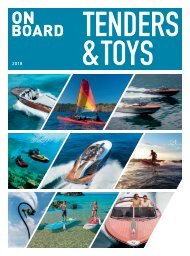ONBOARD Magazine autumn 2023
ONBOARD is aimed purely at the superyacht professional – whether onboard or shoreside. 100% of your spend will hit your targets on the Mediterranean from Palma in Mallorca, Barcelona, through France to Genoa and beyond together with Montenegro and the Aegean, plus the eastern seaboard of Florida. We hand deliver every copy to superyachts over 30m to make sure your message gets in to the hands of the decision makers on board. The publication is also delivered to relevant businesses around the ports and marinas together with shipyards. We also attend the major yacht shows in Monaco, FLIBS, METS, Boote Dusseldorf, Palma and MYBA for on site distribution. Plus, we post over 500 copies to relevant businesses not on the Mediterranean such as the UK, the Netherlands, Germany the rest of northern Europe and of course the USA and Caribbean. We work hard to develop a publication that all the crew and land based decision makers will read from cover to cover. An enjoyable and informative read for everyone means your message will be read. Talking about your brand, product, services and your team is essential and with our help, the message hits the right decision makers.
ONBOARD is aimed purely at the superyacht professional – whether onboard or shoreside. 100% of your spend will hit your targets on the Mediterranean from Palma in Mallorca, Barcelona, through France to Genoa and beyond together with Montenegro and the Aegean, plus the eastern seaboard of Florida. We hand deliver every copy to superyachts over 30m to make sure your message gets in to the hands of the decision makers on board.
The publication is also delivered to relevant businesses around the ports and marinas together with shipyards. We also attend the major yacht shows in Monaco, FLIBS, METS, Boote Dusseldorf, Palma and MYBA for on site distribution. Plus, we post over 500 copies to relevant businesses not on the Mediterranean such as the UK, the Netherlands, Germany the rest of northern Europe and of course the USA and Caribbean.
We work hard to develop a publication that all the crew and land based decision makers will read from cover to cover. An enjoyable and informative read for everyone means your message will be read.
Talking about your brand, product, services and your team is essential and with our help, the message hits the right decision makers.
You also want an ePaper? Increase the reach of your titles
YUMPU automatically turns print PDFs into web optimized ePapers that Google loves.
The buyer’s journey<br />
FINANCE<br />
Andrew Wilson, Head of Aviation and Marine, ZEDRA, Isle of<br />
Man, looks at the points to consider if you’re relocating your<br />
yacht from the Mediterranean to the Caribbean this <strong>autumn</strong><br />
The Mediterranean marinas from Kalamata to Capri to Ibiza<br />
have thinned out as work and school resume and summer<br />
yields to <strong>autumn</strong>. The sensible option is to ship your yacht<br />
across the Atlantic, however if you’re planning to cross under<br />
your own propulsion – either for chartering or for the winter<br />
holidays – below are tips to consider before crossing.<br />
SAFETY<br />
It can take about two weeks to do a transatlantic crossing.<br />
First, ensure the seaworthiness of your yacht and make sure<br />
you’re in compliance with safety regulations, the Atlantic can<br />
be tough on the yacht and crew. Lock down all moveable items<br />
from furniture and galley items to anything else that can move.<br />
Loose items can fly around during rough seas and hurt a crew<br />
member, damage your yacht, or both.<br />
PREPAREDNESS<br />
Crew<br />
Have your crew confirm they are well prepared and discuss their<br />
plan in as much detail as possible. Determine whether your<br />
regular crew or a delivery crew will do the crossing. You won’t<br />
need a full crew, but you will need a sufficient level of coverage to<br />
operate safely. Make sure your crew are certified and insurers<br />
well informed of any crew changes.<br />
Navigation<br />
Your captain will take weather forecasting, currents, and a fuel<br />
stop into account as part of the route planning process. The<br />
route from the Mediterranean to the Caribbean is through the<br />
Strait of Gibraltar and then westward across the Atlantic Ocean<br />
to the Caribbean. Some crews may stop at the Canary Islands,<br />
Cape Verde or the Azores to fuel-up and break up the journey.<br />
The typical time of year for these crossings is mid to late <strong>autumn</strong>,<br />
which is the end of the hurricane season. Make sure crew monitor<br />
weather to avoid hurricane and storm activity. And ensure that<br />
your yacht’s technology and navigation systems are in top form.<br />
Also, make sure there are up-to-date emergency plans in place<br />
and agreed with insurers.<br />
Fuel stop(s)<br />
Remember to contact the fuel provider and schedule your fuelling<br />
appointments well before the journey begins and build any stops<br />
into your itinerary. If fuel quality is a concern, have it validated<br />
as quality can vary around the world. Plan this aspect of the<br />
journey out carefully and build in a contingency plan.<br />
Insurance<br />
Make sure the route you’re planning to take is covered by your<br />
insurance policy. A simple read through the policy wording and<br />
geographic coverage will suffice. However, it’s crucial to share<br />
your itinerary with your insurance broker before the voyage so<br />
there is awareness and underwriters confirm cover. In the event<br />
of an insurance claim you will have comfort that full disclosure<br />
was made at the outset. Speak with your insurance broker to<br />
ensure your regular insurance is appropriate coverage for the<br />
crossing.<br />
BUDGET<br />
After the budget is finalised, make sure the committed funds will<br />
be available to pay additional delivery crew, fuel, taxes (if any),<br />
and operational costs. Note that fuel will be the single largest<br />
expense item in your budget. It will be at least 20% of the total<br />
budget, for regular fuel.<br />
Also, if you plan to charter your vessel in the Caribbean, keep<br />
in mind the time commitment needed to pack up on both ends<br />
of the journey plus the time to do the crossing and make the<br />
yacht ‘guest ready’. Cleaning required from the crossing will<br />
take extra time. This time should also be backed out of earnings<br />
projections for your chartered vessel.<br />
TAXES & CUSTOMS<br />
Depending on where the yacht is in the EU there could be a<br />
customs export declaration to make for departing, and despite<br />
the act of crossing the frontier from domestic to international<br />
waters is well recognised and written into the EU Customs<br />
Code, there is increased awareness to support this with a formal<br />
customs declaration. The type of export declaration will depend<br />
on the current status in the EU and future plans to return to<br />
the EU or not.<br />
In the Caribbean, charter taxes may be due depending on size<br />
and cruising itinerary, a local agent is essential to avoid noncompliance,<br />
your charter manager should know the rules locally.<br />
This is not an operational cost but a consumer tax collected<br />
from the charterer and paid to local authorities.<br />
A transatlantic crossing is a significant undertaking. There are<br />
multiple variables to be carefully managed. Make sure you have<br />
an excellent crew, plan early, and incorporate safety into every<br />
aspect of your planning.<br />
Yacht ownership – regardless of yacht type –<br />
is complex. Having the right partners on<br />
hand who can support an owner with their<br />
structuring needs is key.<br />
For more details<br />
Tel: +44 1624 850500<br />
or visit www.zedra.com<br />
<strong>ONBOARD</strong> | AUTUMN <strong>2023</strong> | 231


